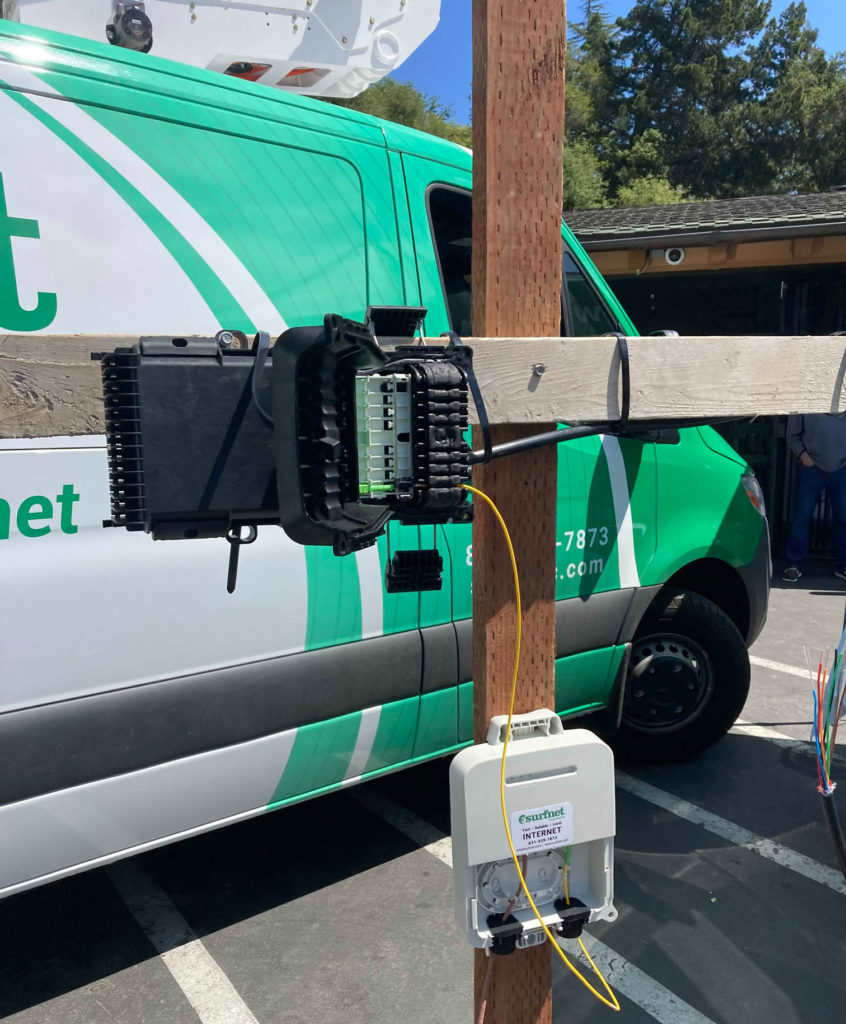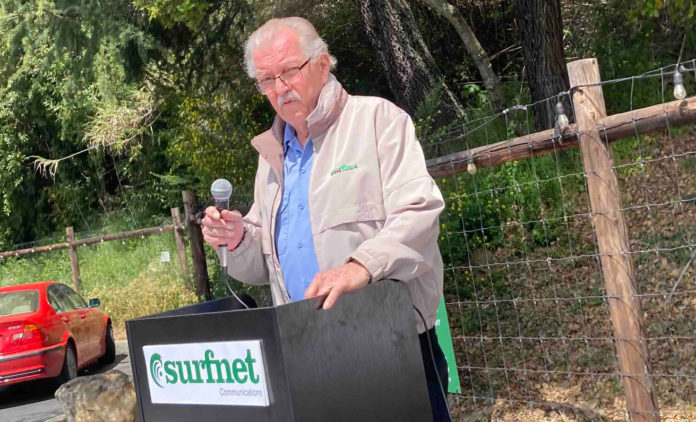During a midday ceremony last Friday at the Summit Store’s parking lot, in the heart of the Santa Cruz Mountains, community members joined with telecom and government officials to celebrate the completion of the first phase of Surfnet Communications’ rural internet expansion.
Mark Morgenthaler, Surfnet’s CEO, said they’ve come a long way from the days when they’d jerry-rig equipment from Fry’s Electronics to provide rudimentary internet to people in the mountains.
“Today marks an important milestone in our trajectory,” he said. “I’m grateful to the employees.”
Other speakers included California Public Utilities Commissioner Darcie Houck; Santa Cruz County Supervisor Monica Martinez; Santa Cruz County Office of Response, Recovery and Resilience Director Dave Reid; and California Broadband Alliance (CBA) President Sanjay Khandelwal.
The CBA played a key role in securing funds from the California Public Utilities Commission for Surfnet.
Khandelwal said the nonprofit owns the fiber and will lease it to Surfnet for 50 years. He told the newspaper they are gearing up to apply for more grants to extend service in the Holy City area in Santa Clara County, in Loma Prieta, in Felton and in Monterey, by partnering with Cruzio, Surfnet and Etheric.
If all goes as planned, they’ll be able to pay each of the internet service providers $17 million.
“There’s nobody else doing this,” he said, referring to the unique nonprofit-private partnership model. “Our goal is to build a network of ISPs.”

Khandelwal explained that one of the big pluses of this approach is the ISP gets to avoid a big tax burden.
“The small ISP doesn’t have to come up with the taxes,” he said. “But they get 50-year rights.”
Similar to tribal or government applicants, because they’re a nonprofit, they automatically get a 20-point boost on the funding application, he added.
“When you’re going against AT&T and Comcast, 20 points is huge,” he said.
Maure Gildea, associate director of economic development and digital access for the Monterey Bay Economic Partnership, explained how they helped CBA with the grant process.
“We went to them and were like, ‘You could have a stronger application if a nonprofit owns that network,’” she said. “It’s really exciting to see that finally come to fruition.”
These days, Gildea added, internet is key to life in the mountains.
“It’s no longer a luxury,” she said. “It’s a necessity.”
Poor service has been a huge frustration for many rural residents, Gildea noted.
“Silicon Valley is right there,” she said. “But there are these pockets where people still don’t have access.”

In June 2024, Surfnet won $10.1 million in funding from the CPUC to build-out internet in Santa Cruz, Santa Clara and San Luis Obispo counties.
It won $4.3 million in September 2024, in partnership with CBA, from the CPUC for Santa Cruz Mountains for 1,423 people in rural Santa Cruz County. That month it also won $2.6 million—again in partnership with CBA—from CPUC for Santa Cruz Mountains service (covering an area east of the Lexington Reservoir in Santa Clara County).
In October 2024, Surfnet secured another $6.2 million in partnership with CBA from the CPUC for SLO County.
Darcie Houck, who was appointed to the CPUC by Gov. Gavin Newsom, said the broadband upgrades are part of making sure no one is left behind in the digital age.
She credited the California Department of Technology, Caltrans, the Department Housing and Community Development, and local and tribal governments for contributing to the statewide push to improve internet access.
“I’m just really honored to be here today,” she said.
Phase 1 locations include Apple Hill Road, Deerfield Road, Del Monte Way, Evergreen Lane, Forest Drive, Highland Way, Loma Prieta Avenue, Mount Bache Road, Radonich Road, Summit Road, Sunset Drive and Spanish Ranch (all of these are east of Highway 17).
Phase 2 construction is underway west of Highway 17—along Baldwin Drive, Blue Mountain Road, Call of the Wild Road, Gillette Drive, Greenwood Drive, Highland Way, Hutchinson Road, Melody Lane, Mountain Charlie Road, Norman Drive, Old Ranch Road, Old Santa Cruz Highway, Pineridge Way, Summit Road, Tahama Court, Burl Court, Citation Drive, Citation Court, Majestic Drive, Midpine Court, Montrose Court, Riva Ridge Road and Tim Tam Court.












